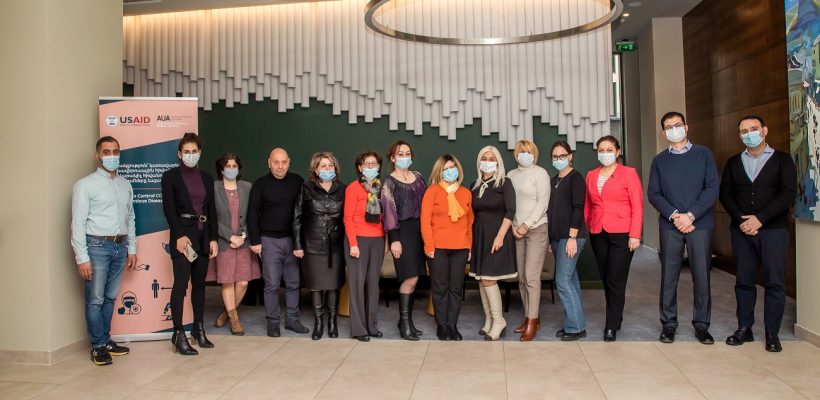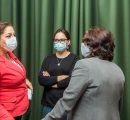
AUA Implements USAID-funded Project Assessing Impact of COVID-19 in Armenia
3 min readYEREVAN, Armenia — The American University of Armenia (AUA) Fund, in collaboration with the Ministry of Health of the Republic of Armenia, is implementing the United States Agency for International Development (USAID)-funded project, Support to Control COVID-19 and Other Infectious Disease Outbreaks. The project aims to strengthen Armenia’s national capacity to control COVID-19 and other infectious disease outbreaks and emergencies of potential public health concern. The work implemented through this project aligns with and advances the Armenian Government’s Public Health Emergency Preparedness and Response agenda.
On February 25, the AUA Turpanjian College of Health Sciences (CHS) and College of Humanities and Social Sciences (CHSS) jointly organized a stakeholder meeting. Participants included representatives from the Ministry of Health, the National Center for Disease Control and Prevention, and the Ministry of Labor and Social Affairs. AUA presented findings from its recent assessment which studied the impact of COVID-19 on the social and healthcare sectors. The AUA team also presented the results of an additional research project which investigated the public’s compliance with prevention rules and the effectiveness of behavior change activities. Each presentation was followed by a discussion period, during which participants developed recommendations for the government to better prepare for emergency response.
The study utilized the qualitative study method. In-depth interviews were conducted with 34 participants who were current or former policy makers, government officials, international organizations representatives, and representatives from self-governing bodies. The identities of the study participants were not revealed, and the ideas they expressed were analyzed and presented in the report in their aggregated form.
Respondents working for different ministries in the government identified the challenges associated with the transition to remote work, including the increased need for digital communication, as a primary issue posed by the COVID-19 outbreak. However, while initially disruptive, the government was able to adapt to 100% remote work within a few weeks. Additionally, findings showed that when asked about their perceived gaps in the legal system, the majority of respondents had difficulty identifying any. Respondents also indicated that one barrier to quick action at the outset of the pandemic was the government’s lack of emergency preparedness plans.
The study also explored the impact of the pandemic on society and social services from the point of view of policy makers and community leaders of selected communities. The study revealed inequalities in the educational sector and access to healthcare, issues that were exacerbated by the need to alter business-as-usual, close schools, and reassess health protocols. Although the Armenian government tried to provide assistance to vulnerable segments of the population, the aid packages were not well-targeted to reach those with the greatest need.
Based on these findings and discussions, conference participants suggested introducing legal reforms to adopt collaborative mechanisms within the government and across ministries, that would enable coordination and preparedness in the event of disease outbreaks. The participants also propounded that the Law on Emergency Situations should specifically name the bodies and institutions that would be required to form a united team to manage and monitor emergency situations. Further, legal instruments such as a well-defined Emergency Preparedness and Response Plan should indicate the mechanisms for collaboration among the different branches of the government and also specify appropriate budgetary resources.
Through the USAID project, AUA will next work to develop an action plan in collaboration with the Armenian government to strengthen state capacity to respond in emergency situations of public health concern at the national and sub-national levels. The plan will also include support in drafting revisions to the legal framework.
The AUA Turpanjian College of Health Sciences works actively to improve population health and health services in Armenia and the region through interdisciplinary education and development of public health professionals to be leaders in public health, health services research, and evaluation, health care delivery, and management.









